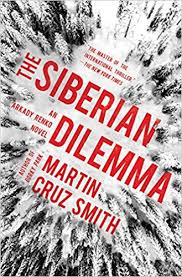Once American intelligence agencies verified that Russia interfered in the 2016 election, it behooved all thinking Americans to inform themselves about our long-term enemy, an enemy many of us thought was no longer a potent threat. The invasion of Ukraine and the recent suspicious Siberian death of Alexei Navalny, Vladimir Putin’s foremost opponent, makes educating ourselves even more pressing.
You couldn’t start anywhere better than with the crime novels of Martin Cruz Smith. They present a wide-ranging, richly-textured portrait of the ailing, corrupt Soviet Union collapsing and slowly turning into an even more corrupt, money-mad Russian kleptocracy. A country that undermines American democracy in profound and devilish ways, like supporting the current Speaker of the House with campaign donations.
The touchstone for all this upheaval is the cynical, battered hero Arkady Renko. Renko should have risen much higher than he has as a police inspector, because his father was a famous general in The Great Patriotic War (WWII). But he disobeys orders, won’t cut corners, and won’t accept cover-ups. In other words: he’s honest. It hasn’t done him any good in the old order and it’s even less helpful in the new one where everything is for sale. In fact, it almost gets him killed more than once.
His latest dangerous case sends him to Siberia in search of his testy journalist girlfriend Tatiana who’s risking her life researching a story about oligarchs and oil–and much more than she’s let him know about. Siberia is “where strange things happened and stranger things were just around the corner…It was a zone on the edge where planes of existence overlapped. Nothing was inexplicable.”
But everything is potentially lethal. When Arkady lands in the grim Siberian city of Chita, the chatty cab driver laughingly warns him, “Don’t go by first impressions. It gets worse. A few days ago an oil tanker on a train headed to Moscow exploded two kilometers from the station. It went up in flames for no good reason. They say you could have seen the blast from the moon.”
Renko asks if that happens often there and the driver says, “It’s Chita. Anything can happen.” And anything does, as Arkady is the subject of more violence in this book than ever before, or perhaps more accurately, violence unlike anything he could have imagined.
I’ve read all of the previous novels twice and look forward to reading them again. They’re beautifully written, but not in such a way as to interfere with the narrative. Every word serves the story, like these quietly ominous lines from Three Stations: “Yegor’s name was like a drop of ink in water. Everything took a darker shade.”
Line by line he’s also one of the funniest novelists we have, and Renko’s sly insolence when dealing with his nasty boss Zurin is one of the highlights of the series. Their barbed relationship doesn’t prepare you, though, for a shocking request Zurin makes near the end of the book that could not only change Renko’s life but change the course of Russian history. And while the characters may be fictional, their prototypes are not.
“Brilliant” may be an over-used word for reviewers, and so is “stunning”–but both of them fit. There’s more to say than that, however. Martin Cruz Smith has been writing an epic history of contemporary Russia that should have earned him the Nobel Prize for Literature by now. ★★★★★
Lev Raphael has reviewed for The Detroit Free Press, The Washington Post and other publications, online journals, and radio stations. He is the author of 27 books in many genres.

